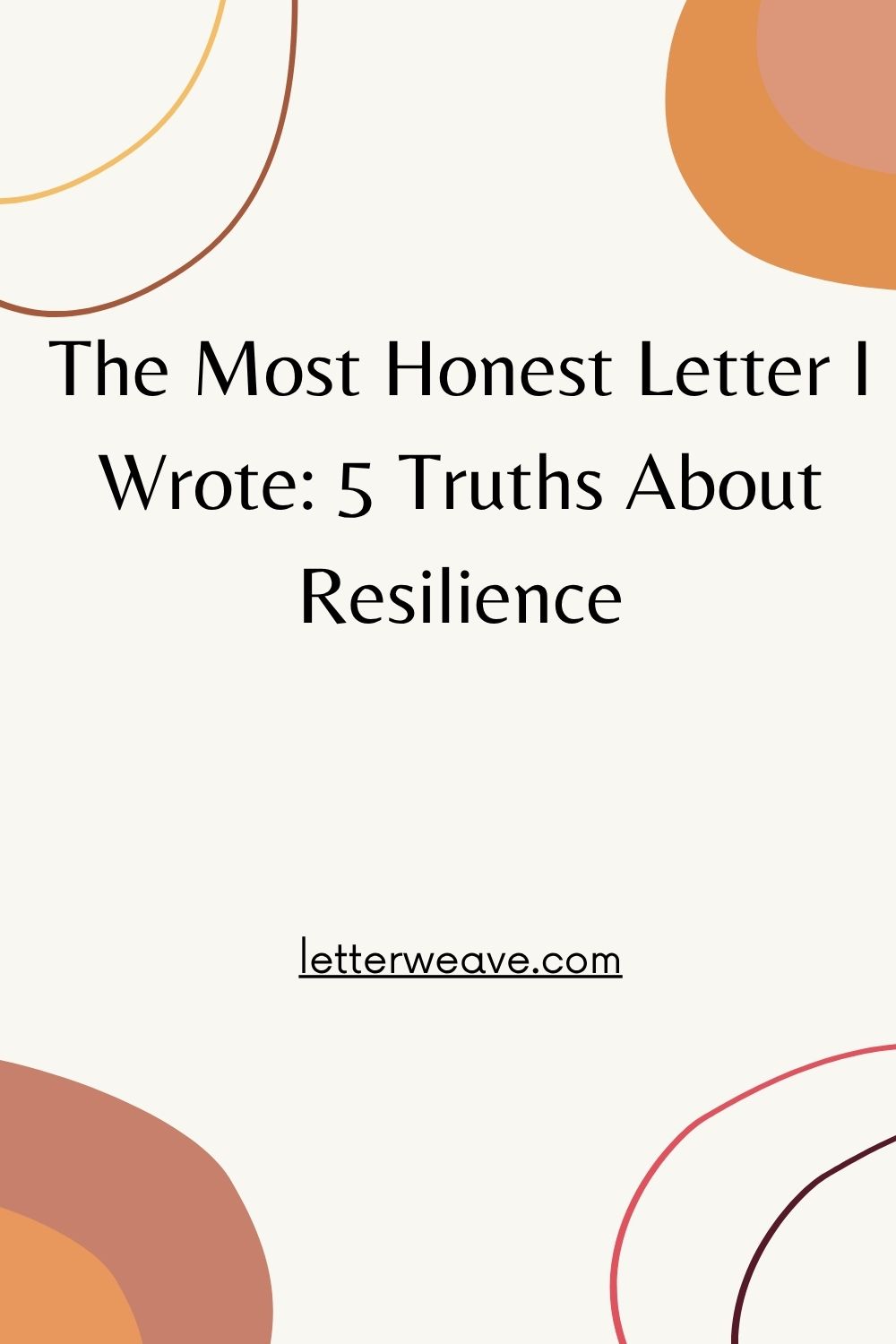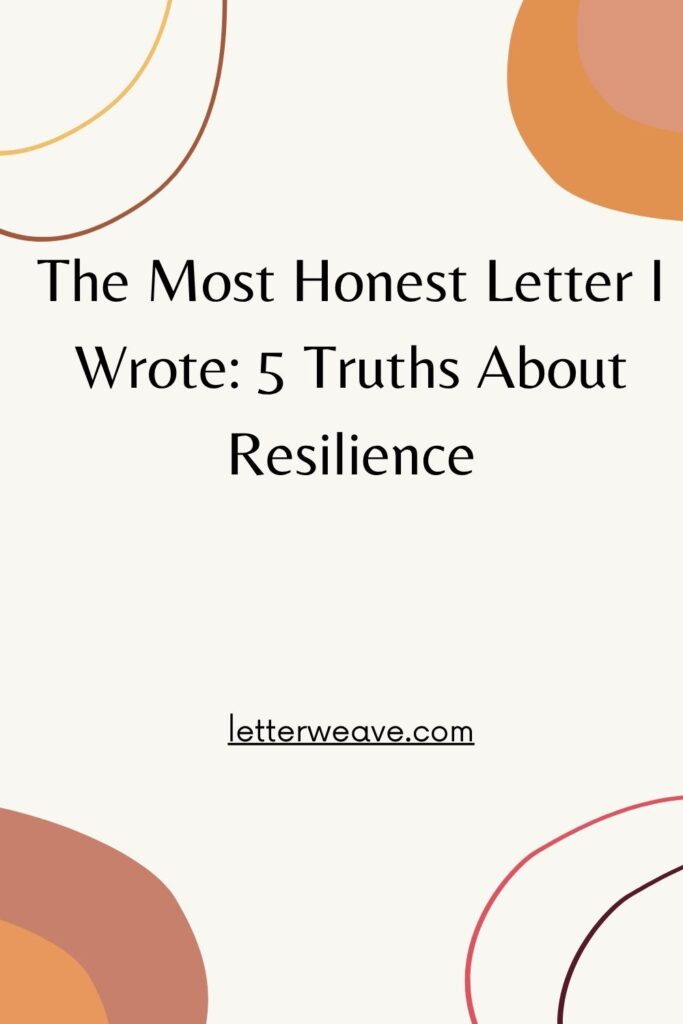Phone:
01752740808
Address:
kishoreganj - Dhaka - Bangladesh

It started with a Target parking lot. I was sitting in my car, staring at the red shopping cart someone left crookedly in the space next to mine. I wasn’t mad at the cart. I was mad because my entire life felt like that cart—off-kilter, abandoned, kind of in the way. I’d just gotten off a phone call that felt like the last Jenga piece was pulled: rent overdue, relationship imploding, job not as secure as I pretended it was. And the kicker? I had to go in and buy paper towels. Somehow that felt like the cruelest part.
That was the moment I started writing the most honest letter of my life. To myself. Not the “you’re doing great sweetie” version, but the “girl, let’s talk before we implode” version. It wasn’t inspirational. It was survival. It was a mess. But it was the first time I said the word resilience and didn’t mean it in the Instagram-quote way. I meant it in the “I don’t want to quit, but I kind of do” way.

Here’s the thing nobody tells you about resilience: it’s not some glorious moment where you rise like a phoenix and your ex sees you on Instagram looking hot and regretful. Sometimes resilience looks like eating cereal for dinner and texting your therapist a meme instead of spiraling. It’s answering one email when your inbox feels like an avalanche. It’s whispering, “We’ll try again tomorrow,” when today was a dumpster fire.
I used to think resilient people were brave in a way I wasn’t. That they had some kind of special DNA that made them bounce back faster or handle mess better. But no. Resilience isn’t coded into your personality. It’s practiced. And if you’ve ever made it through a day you didn’t think you could survive? Guess what—you’ve got it.
There’s this weird pressure, especially for women, to make pain pretty. To package the hard stuff with a bow and a moral lesson so we don’t make anyone uncomfortable. I used to do that too. I’d laugh off heartbreak, post the poetic caption, and say “it is what it is” even when it very much wasn’t. But the day I wrote that messy letter, I stopped performing strength and started living it. Quietly. Privately. Imperfectly. And it was the first time I actually felt powerful.
Not performative power—the kind you post about. But real power. The kind that sits with the ache and says, “Okay, what now?” That keeps showing up even when you feel like a bruised banana of a human being.
So if you came here hoping for a transformation story with a neat bow at the end—spoiler alert: I’m still in it. Still figuring it out. Still occasionally crying over irrelevant things like dropped fries or plot twists in shows I’ve already seen.
But I’ve learned some painfully honest truths about resilience. Stuff I wish someone had told me before I started romanticizing bounce-backs and hustling through heartbreak. These truths don’t come with a glow-up filter or a catchy affirmation. They came to me in tear-streaked car rides, awkward therapy silences, and that paper towel aisle where I realized—maybe falling apart isn’t the end. Maybe it’s the invitation.
Up next:
Let’s walk through the five truths that shaped the letter I never meant to write—five truths about resilience that might not sound pretty, but will absolutely meet you where you are.
Spoiler: I was wrong. I used to think resilience was about staying calm while your life burned quietly in the background, like some emotionally constipated superhero. But no—resilience is what happens after the meltdown. After you sob into your laundry or panic-scroll job listings at 2 a.m.
Real resilience shows up when you’ve fully lost it—and then choose to keep going.
Like the day I opened my email and cried because someone used too many exclamation points. (Apparently that was my emotional breaking point.) But I still showed up. Not in a grand, powerful way. I just replied to one email. And that counted.
You’re allowed to break. Resilience isn’t about the absence of falling apart—it’s about rising honestly after.
Here’s the part no one posts about: resilience is boring. It’s brushing your teeth when your brain says, “Why bother?” It’s making the to-do list, not finishing it, and not letting that spiral you into shame-ville.
For me, it was deciding to shower and make a real breakfast, even when no one would see me. Especially when no one would see me.
There’s no applause for resilience in real life. Just tiny, defiant acts of trying again.
And sometimes that’s the hardest part—continuing the quiet things that rebuild you, without the validation or external sparkle.
Truth bomb: If your resilience looks like microwaving soup and texting “still here” to your friend—you’re doing it right.
Resilience asked me to let go of some things. Dreams I clung to for too long, versions of myself I outgrew, identities that no longer served me but still felt familiar.
Grieving who I thought I’d be was painful. It was like breaking up with a fantasy version of myself: the one who had it all figured out by 30, the one who didn’t cry in the grocery store, the one who didn’t need a Plan B.
Resilience isn’t just moving forward—it’s mourning what didn’t work out, and still believing there’s more ahead.
Letting go didn’t mean I failed. It meant I made space for who I actually am becoming. And that? That’s brave in a way no glow-up can measure.
I thought I’d “get better” in a clean upward arc. Like once I found my footing, I’d be forever stable. But life came back with plot twists and passive-aggressive surprises.
Some weeks I feel like I’m thriving. Other days, my greatest achievement is not crying at the DMV.
Resilience is messy. And cyclical. And full of relapses into old patterns. But that doesn’t mean you’re not healing.
It means you’re human.
Healing isn’t a straight line. Resilience is learning to keep walking even when you’re circling the same emotional cul-de-sac again.
This was the hardest truth for me to swallow. I kept waiting to feel brave. To feel strong. To feel like I had what it took.
But resilience isn’t a feeling—it’s a decision. A quiet “yes” to keep showing up. You don’t have to feel confident, composed, or even remotely okay to be resilient. You just have to choose not to give up today.
Resilience happens in the decision to try again, not in the certainty of success.
Some of my most resilient moments felt like defeat. Like pressing send on an application I didn’t think I’d get. Like speaking up in a room where I felt invisible. Like getting out of bed when everything felt pointless.
If you’re still showing up, even imperfectly—you’re resilient already.
Because the world keeps telling us resilience should look polished. That if we’re truly strong, we’ll rise quickly, bounce back beautifully, and somehow make it all look effortless. But that narrative is exhausting. And fake.
The truth? Real resilience is gritty. Quiet. Unseen.
It’s surviving moments no one claps for. It’s growing through what almost undid you. It’s redefining what strength looks like in your own voice, not someone else’s highlight reel.
If we keep waiting to feel resilient before we let ourselves move forward, we’ll stay stuck in cycles of silence and shame.
You don’t have to wait for a grand breakthrough. You just have to recognize the brave little acts you’re already doing.
You being here, still reading this, still breathing through the ache? That’s resilience, too.
So let me circle back to that Target parking lot. To the version of me who felt like a crooked cart—abandoned, in the way, not where she belonged. I wish I could hug her. I wish I could tell her she wasn’t broken, just in the middle of a becoming.
And maybe that’s you right now.
Maybe you’re sitting in your version of that parking lot. Maybe you feel like you’re holding a story that’s too messy, too unglamorous, too unfinished to be worth telling.
But hear this:
You don’t have to feel brave to be brave.
You don’t have to be whole to be healing.
You don’t need a comeback story to be worthy of love and rest and hope.
Your resilience isn’t loud. It doesn’t need to be.
It’s in your breath. Your try. Your refusal to quit on yourself entirely.
So here’s your permission slip: You’re allowed to be a work-in-progress. You’re allowed to keep going messy. To be soft and strong. Tired and trying.
And when you forget all that? Come back to this letter.
Because the most honest thing I can tell you is this:
You’re doing better than you think. And your resilience is already enough.